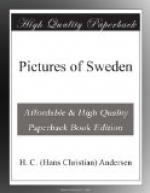“In former days,” as it is said by most, “everything came spontaneously. Our age has not such revelations; now one must slave and drudge if one would get anything; one must dig down into the deep shafts after the metals, which decrease more and more;—when the earth suddenly stretches forth her golden finger from California’s peninsula, and we there see Monte Christo’s foolishly invented riches realized; we see Aladdin’s cave with its inestimable treasures. The world’s treasury is so endlessly rich that we have, to speak plain and straightforward, scraped a little off the up-heaped measure; but the bushel is still full, the whole of the real measure is now refilled. In science also, such a world lies open for the discoveries of the human mind!
“But in poetry, the greatest and most glorious is already found, and gained!” says the poet. “Happy he who was born in former times; there was then many a land still undiscovered, on which poetry’s rich gold lay like the ore that shines forth from the earth’s surface.”
Do not speak so! happy poet thou, who art born in our time! thou dost inherit all the glorious treasures which thy predecessors gave to the world; thou dost learn from them, that truth only is eternal,—the true in nature and mankind.
Our time is the time of discoveries—poetry also has its new California.
“Where does it exist?” you ask.
The coast is so near, that you do not think that there is the new world. Like a bold Leander, swim with me across the stream: the black words on the white paper will waft you—every period is a heave of the waves.
* * * * *
It was in the library’s saloon. Book-shelves with many books, old and new, were ranged around for every one; manuscripts lay there in heaps; there were also maps and globes. There sat industrious men at little tables, and wrote out and wrote in, and that was no easy work. But suddenly, a great transformation took place; the shelves became terraces for the noblest trees, with flowers and fruit; heavy clusters of grapes hung amongst leafy vines, and there was life and movement all around.
The old folios and dusty manuscripts rose into flower-covered tumuli, and there sprang forth knights in mail, and kings with golden crowns on, and there was the clang of harp and shield; history acquired the life and fullness of poetry—for a poet had entered there. He saw the living visions; breathed the flowers’ fragrance; crushed the grapes, and drank the sacred juice. But he himself knew not yet that he was a poet—the bearer of-light for times and generations yet to come.
It was in the fresh, fragrant forest, in the last hour of leave-taking. Love’s kiss, as the farewell, was the initiatory baptism for the future poetic life; and the fresh fragrance of the forest became sweeter, the chirping of the birds more melodious: there came sunlight and cooling breezes. Nature becomes doubly delightful where a poet walks.




